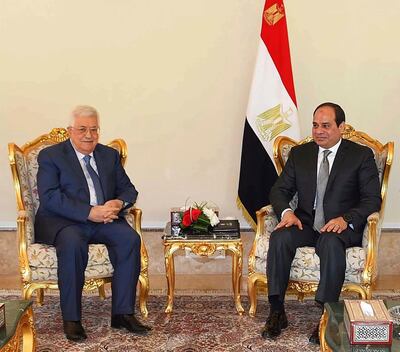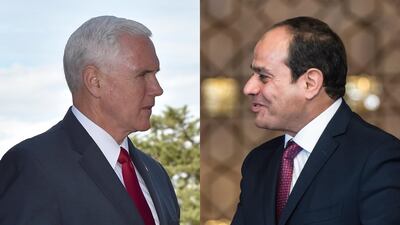The US vice president Mike Pence arrives in Cairo on Saturday for talks with Egypt's Abdel Fattah El Sisi on “the shared need to combat terrorism" at a time when ties between the once close allies have been strained further by Washington's recent policy decisions on the Israeli-Palestinian conflict.
President Donald Trump's early endorsement of Mr El Sisi had raised expectations that Egypt's status as a key security partner would be restored after Barack Obama left the White House. But his decision to recognise Jerusalem as Israel's capital has dashed hopes that he could team up with the Egyptian president to help reach a peace deal with the Palestinians.
Mr Pence’s curtailed itinerary in Egypt, the first stop of a delayed regional tour that will also take him to Jordan and Israel, reflects the depth of Arab anger and disappointment. He had been scheduled to meet Al Azhar’s grand imam, Ahmed El Tayyeb, and Coptic Pope Tawadros II while in Egypt, but both religious leaders revoked their invitations.
American diplomats say their Egyptian counterparts have made clear the protocol of the trip would reflect Mr Pence's status as a secondary figure, with no joint press conference or opportunity to engage the wider public.
Magda Shahin, a former Egyptian diplomat and director of the Centre for American Studies and Research at the American University in Cairo, said officials are well aware of the role of vice presidents in US administrations, as emissaries rather than decision makers.
“One of his objectives is to try and explain to the leaders that the embassy move will not preclude the eventual designation of East Jerusalem as the capital of the Palestinians in the framework of a two-state accord,” said Ms Shahin.
Mr Pence might convey a message that Washington was still willing to host Palestinian-Israeli peace talks, Ms Shahin added. But Palestinian leader Mahmoud Abbas has ruled out any future role for the US as a mediator in the conflict, and no one in Cairo expects Mr El Sisi to press Mr Abbas or other Arab leaders to put faith in an effort co-ordinated by Washington.

Mr El Sisi has made clear that a Palestinian-Israeli peace deal is essential to reduce the grievances fuelling violent extremism in the region.
Egypt helped to broker a Palestinian reconciliation deal last year between the Gaza-based Islamist Hamas faction and the secular nationalist Fatah movement in Ramallah, which it viewed as a precursor to new and substantive talks with Israel. But Mr Trump's embassy announcement on December 5 threw Egypt's diplomatic efforts into disarray.
The Israeli-Palestinian issue leads the points of contention between Washington and Cairo.
Last year the US administration cut almost $100 million (Dh367m) in military aid and withheld another $195m, citing concerns over human rights.
Mr Pence is expected to also raise the issue of the rights and security of Coptic Christians — something Egyptian officials say is a domestic matter that they are tackling.
Mohammed Anwar Sadat, leader of the liberal Reform and Development Party who on Monday dropped his campaign for the presidency, said this was not the ideal time to raise such concerns.
“I would rather have seen the Pence visit postponed further until things had calmed down,” said Mr Sadat.
"Most Egyptians are furious about the embassy announcement, so the government is not feeling pressured to listen to the American concerns about human rights or sectarian violence."
Mr Pence travels to Jordan on Sunday before visiting Israel on Monday and Tuesday.
_____________
Read more:
PLO meeting: Review of Oslo Accords 'top of agenda'
Another potential candidate pulls out of Egyptian presidential race
Egypt's Copts prepare for opening of cathedral in new administrative capital
______________

